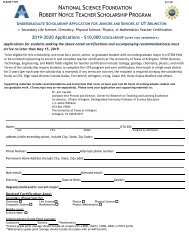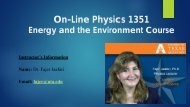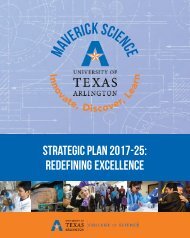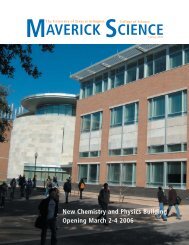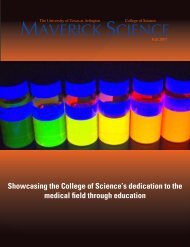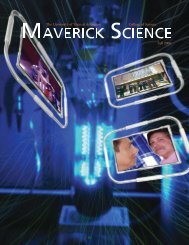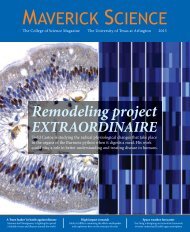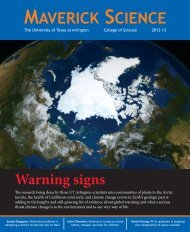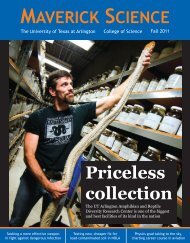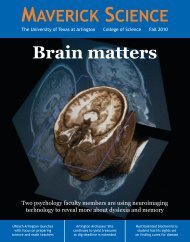Maverick Science mag 2013-14
You also want an ePaper? Increase the reach of your titles
YUMPU automatically turns print PDFs into web optimized ePapers that Google loves.
the hopes that such techniques might not only solve<br />
equations of current interest, but also any equations of<br />
the same type that might arise in physics in the future.”<br />
Among Vancliff’s projects which could benefit research<br />
in physics is one with Thomas Cassidy, professor<br />
and math department chair at Bucknell University,<br />
which focuses on generalizing the notion of Clifford algebra<br />
and using geometry to motivate their proposed<br />
generalization. Clifford algebras, which offer a direct<br />
way to model geometric objects and their transformations,<br />
have numerous applications in physics.<br />
“Our work together involves a variation on classical<br />
Clifford algebras. Clifford algebras have many applications<br />
in theoretical physics, and we have been stretching<br />
these ideas to encompass a broader family of algebraic<br />
structures, with the hope of finding applications in<br />
quantum physics,” Cassidy said. “Michaela is a remarkably<br />
tenacious researcher. Mathematical research is<br />
often characterized by sudden realizations or insights,<br />
but those insights can only come after prolonged and<br />
intense study. Michaela has the mathematical drive and<br />
vision to delve into very abstract concepts and find hidden<br />
connections.”<br />
Vancliff is also working with UT Arlington associate<br />
professor of math Dimitar Grantcharov, an expert in<br />
representation theory, on a long-term project aimed at<br />
describing a recently defined ring, called a graded skew<br />
Clifford algebra, in terms of a Lie bracket and Poisson<br />
geometry, and using that information to classify certain<br />
modules of the ring. Vancliff and Cassidy were the first<br />
ones to propose the idea of the graded skew Clifford algebra,<br />
in 2010.<br />
“Dr. Vancliff is a very talented mathematician and<br />
she is highly dedicated to research, teaching and service,”<br />
said Jianzhong Su, professor and chair of the math<br />
department. “The field she works in is quite abstract,<br />
even for other mathematicians, but this kind of mathematics<br />
is reflective to some of the deeper insights in<br />
modern physics. Dr. Vancliff is one of the leaders in this<br />
research field, and the importance of her work is widely<br />
recognized by the scientific community.”<br />
A<br />
n analytical mind was seemingly<br />
hard-wired into Vancliff’s DNA.<br />
She was born in England, northeast<br />
of London in Essex County,<br />
and her father was an electrical<br />
engineer. He instilled in her a desire<br />
to understand how things<br />
work. Initially, she was interested<br />
in physics, but in high school she was inspired by one of<br />
her math teachers, who felt strongly that Vancliff should<br />
pursue a mathematics degree. The teacher remained a<br />
friend and mentor until his passing a few years ago.<br />
“In hindsight, I believe I was interested in structural<br />
patterns that make stuff work, more than in the physical<br />
inner workings, and that interest translated into a desire<br />
to understand the mathematics that explains how<br />
stuff works,” she said. “From the entire cosmos down<br />
to the tiniest flower petal, mathematics is behind the<br />
scenes making it all work, and I wanted to understand<br />
it all.”<br />
After finishing secondary school, Vancliff enrolled at<br />
the University of Warwick, in Coventry, England where<br />
she earned a B.S. in Mathematics in 1986. Her degree<br />
was in pure mathematics, but she also took courses in<br />
quantum physics, special relativity and general relativity.<br />
While at Warwick, one of the math faculty members<br />
suggested that she pursue a graduate degree in the<br />
United States, at the University of Washington.<br />
“He was very familiar with the university and the city<br />
of Seattle, and he felt that I would excel in that environment,”<br />
Vancliff said. “Since I very much enjoyed living<br />
in Seattle and being a student at the University of Washington,<br />
I guess he was right.”<br />
“Michaela is a remarkably<br />
tenacious researcher. [She]<br />
has the mathematical drive<br />
and vision to delve into very<br />
abstract concepts and find<br />
hidden connections.”<br />
– omas Cassidy<br />
Bucknell University professor of mathematics<br />
She taught high school math in London for a year<br />
after graduating from Warwick, then moved to Seattle<br />
and began work on a Ph.D. in mathematics with the intention<br />
to focus on applied math. During her first year,<br />
while taking a mandatory graduate algebra class, she<br />
was introduced to the notion of a module over a ring.<br />
“I immediately recognized it as a generalization of<br />
the idea of matrices acting on a vector space, which is a<br />
pervasive topic throughout all of the applied sciences,”<br />
Vancliff said. “So a light bulb lit up in my brain, and I<br />
fell in love with algebra.”<br />
Her interests were mainly in physics applications, so<br />
Vancliff was drawn to study modules over non-commutative<br />
rings. At that time, the study of modules over<br />
commutative rings had been ongoing for decades due<br />
to the use of geometric techniques. In a bit of perfect<br />
timing, Vancliff began her graduate studies just as a new<br />
movement had started in the world of algebra that<br />
pushed the study of non-commutative rings and their<br />
modules via geometric techniques. This new subject became<br />
known as non-commutative algebraic geometry.<br />
“This was an entirely new subject, and I was fortunate<br />
to enter it at its inception,” she said. “There were<br />
many open problems ripe for the picking and many that<br />
were accessible to junior researchers such as myself.<br />
This meant that I was able to make groundbreaking<br />
contributions to the subject while I was still a student,<br />
simply because the subject was so new. I found it to be<br />
very exciting.”<br />
Vancliff says that she was fortunate that her Ph.D.<br />
advisor at the University of Washington, S.P. Smith,<br />
took his responsibilities very seriously.<br />
“Not only does he have a rare gift for being able to<br />
explain mathematics and its intricate beauty, but he also<br />
devoted time to teaching me how to write research publications<br />
and funded my participation at conferences<br />
and workshops,” Vancliff said. “He actively encouraged<br />
me to network and interact with famous mathematicians,<br />
and those opportunities proved to be invaluable<br />
to me throughout my career.”<br />
Vancliff earned her Ph.D. in 1993, and then worked<br />
for two years as a visiting assistant professor at the University<br />
of Southern California in Los Angeles. From<br />
there, she moved to Belgium and worked for a year as a<br />
researcher at the University of Antwerp, before spending<br />
two years at the University of Oregon in Eugene. In<br />
1997, Vancliff had a conversation with a colleague in<br />
Oregon which led to a significant career decision. The<br />
colleague had family living in Fort Worth and was familiar<br />
with the North Texas region.<br />
“He felt very strongly that I would be happy working<br />
at UT Arlington and living in the DFW area, so he encouraged<br />
me to apply to UT Arlington,” Vancliff said. “I<br />
investigated UT Arlington online and found a vibrant,<br />
growing university.”<br />
When she interviewed in 1998, she found that the<br />
department was strong in applied mathematics and less<br />
so in algebra, which Vancliff took as a “positive challenge”.<br />
She joined the faculty as an assistant professor<br />
starting that fall.<br />
“The department has changed much in the past 15<br />
years, and its research has grown in strength, with many<br />
of the current faculty earning research grants,” she said.<br />
Her own research has been continuously funded since<br />
her arrival.<br />
V<br />
ancliff is working with her graduate<br />
students on several projects.<br />
She and third-year doctoral student<br />
Richard Chandler are looking<br />
at the point schemes and line<br />
schemes of a family of algebras<br />
and trying to understand the algebras'<br />
underlying structure.<br />
Chandler first met Vancliff when he was an undergraduate<br />
in her Abstract Algebra class in 2010. He earned a<br />
B.A. in Mathematics with teaching certification in May<br />
2011 and entered the Ph.D. program that fall. He wants<br />
to go into academia after earning his doctoral degree.<br />
“Dr. Vancliff is an amazing mentor,” Chandler said.<br />
“She has very high standards for all of her students, but<br />
they are always reasonable. She doesn’t expect perfection,<br />
but she does expect that you put 100 percent into<br />
all aspects of your work.”<br />
Padmini Veerapen studied under Vancliff and<br />
earned a Ph.D. in May <strong>2013</strong>. She’s now an assistant professor<br />
of math at Tennessee Technological University in<br />
Cookeville, Tenn.<br />
“Dr. Vancliff emphasized a level of detail and thoroughness<br />
during my years under her supervision that is<br />
allowing me now to successfully handle all my responsibilities<br />
as a faculty member,” Veerapen said.<br />
In addition to her research and teaching, Vancliff is<br />
the organizer of the long-running DFW Algebraic<br />
Geometry, Algebra and Number Theory (AGANT) seminar<br />
series, which brings together researchers and students<br />
from academia and industry in the Metroplex and<br />
beyond and features national and international speakers.<br />
She also created the department’s Graduate Forum,<br />
which helps junior Ph.D. students by letting them talk<br />
with faculty mentors and senior doctoral students.<br />
“It is very fulfilling and satisfying to share my knowledge<br />
with my students and see them enjoy the material<br />
as much as I do,” Vancliff said. “When they see the connections<br />
that I see and share with me their delight in<br />
finding new connections, I can see how much they have<br />
grown mathematically, and that is a joy to witness. It is<br />
particularly exciting to see them continue a research<br />
path after graduation, especially in academia where they<br />
can continue this sharing of knowledge with the next<br />
generation of students.”<br />
Vancliff says that helping and sharing her knowledge<br />
with others, working as part of a team, and using the<br />
technical expertise she has acquired to solve problems<br />
are all rewarding aspects of her job as a researcher and<br />
educator.<br />
“I very much enjoy that my work at UTA entails all<br />
these components, both individually and in combination,”<br />
she said. “I also find that my success at earning<br />
research grants renews my energy, not only in the research<br />
arena, but in all aspects of my job. I consider myself<br />
very fortunate to be able to work in my chosen<br />
career, and in the supportive environment of UTA.” n<br />
<strong>Maverick</strong> <strong>Science</strong> <strong>2013</strong>-<strong>14</strong><br />
43



